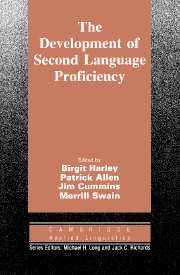Book contents
- Frontmatter
- Contents
- List of contributors
- Series editors' preface
- Acknowledgments
- Introduction
- I THE NATURE OF LANGUAGE PROFICIENCY
- II CLASSROOM TREATMENT
- III SOCIAL AND INDIVIDUAL VARIABLES
- Chapter 9 Social and individual factors in the development of bilingual proficiency
- Chapter 10 Social and individual factors in language acquisition: some models of bilingual proficiency
- Chapter 11 The role of context and age in the development of bilingual proficiency
- Chapter 12 The relationship between first and second languages: language proficiency and language aptitude
- Chapter 13 Response by DBP project members to the discussion papers of Richard Bourhis and Alison d'Anglejan
- IV PRACTICAL AND POLICY IMPLICATIONS
- V THIRTY-FIVE YEARS OF RESEARCH ON BILINGUALISM
- CONCLUSION
- References
- Author Index
- Subject Index
Chapter 11 - The role of context and age in the development of bilingual proficiency
Published online by Cambridge University Press: 05 October 2012
- Frontmatter
- Contents
- List of contributors
- Series editors' preface
- Acknowledgments
- Introduction
- I THE NATURE OF LANGUAGE PROFICIENCY
- II CLASSROOM TREATMENT
- III SOCIAL AND INDIVIDUAL VARIABLES
- Chapter 9 Social and individual factors in the development of bilingual proficiency
- Chapter 10 Social and individual factors in language acquisition: some models of bilingual proficiency
- Chapter 11 The role of context and age in the development of bilingual proficiency
- Chapter 12 The relationship between first and second languages: language proficiency and language aptitude
- Chapter 13 Response by DBP project members to the discussion papers of Richard Bourhis and Alison d'Anglejan
- IV PRACTICAL AND POLICY IMPLICATIONS
- V THIRTY-FIVE YEARS OF RESEARCH ON BILINGUALISM
- CONCLUSION
- References
- Author Index
- Subject Index
Summary
This chapter focuses on the set of DBP studies relating to the issue of the role of context and age in the development of bilingual proficiency. As I approached the task, it was my hope to use the two themes as a point of departure and to see how they were dealt with empirically in the various papers. However, because the papers are so disparate, they will be discussed sequentially and then synthesized.
Language attitudes and bilingual proficiency of Portuguese-Canadian children in Toronto
Perhaps the most exciting aspect of this study by Cummins, Lopes, and King (1987) is the focus on assessing the mother-tongue development of these minority group children. It is paradoxical that whereas the assessment of mother-tongue proficiency has been at center stage of the immersion evaluations, the mother-tongue development of Greek, Portuguese, Italian, or Arab children in Canada being schooled in English is so easily overlooked, or viewed as irrelevant or not amenable to systematic investigation by mainstream investigators. It has taken a long time for Lambert's (1974) writings on additive bilingualism and Cummins's (1981a) interdependence theory to give rise to research in which a lesser-status minority language mother tongue is granted equal resources in terms of testing and data analysis. While I think this study will stimulate other researchers (including myself) by showing us that such research can be successfully carried out in the context of the public school system, I believe it may have an even greater impact on minority group students, their parents, and anglophone educators, for it removes Portuguese, at least symbolically, from a marginal status and enhances its legitimacy in the school.
Information
- Type
- Chapter
- Information
- The Development of Second Language Proficiency , pp. 146 - 157Publisher: Cambridge University PressPrint publication year: 1990
